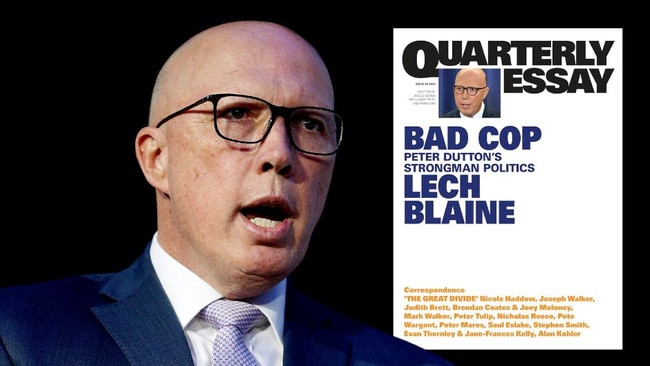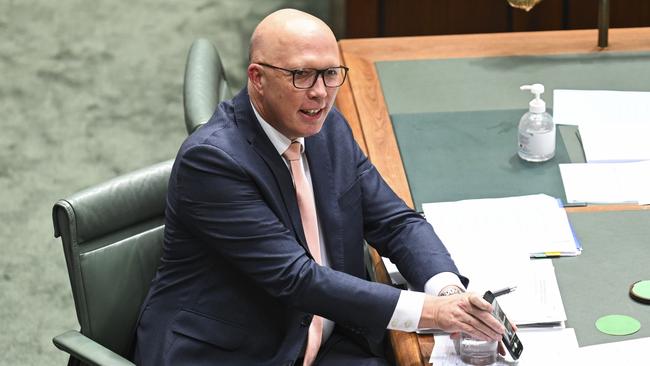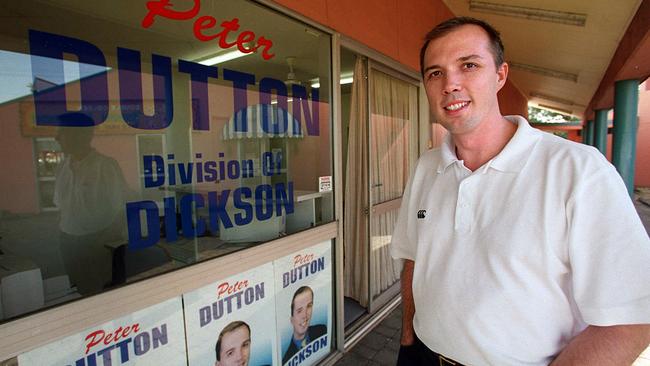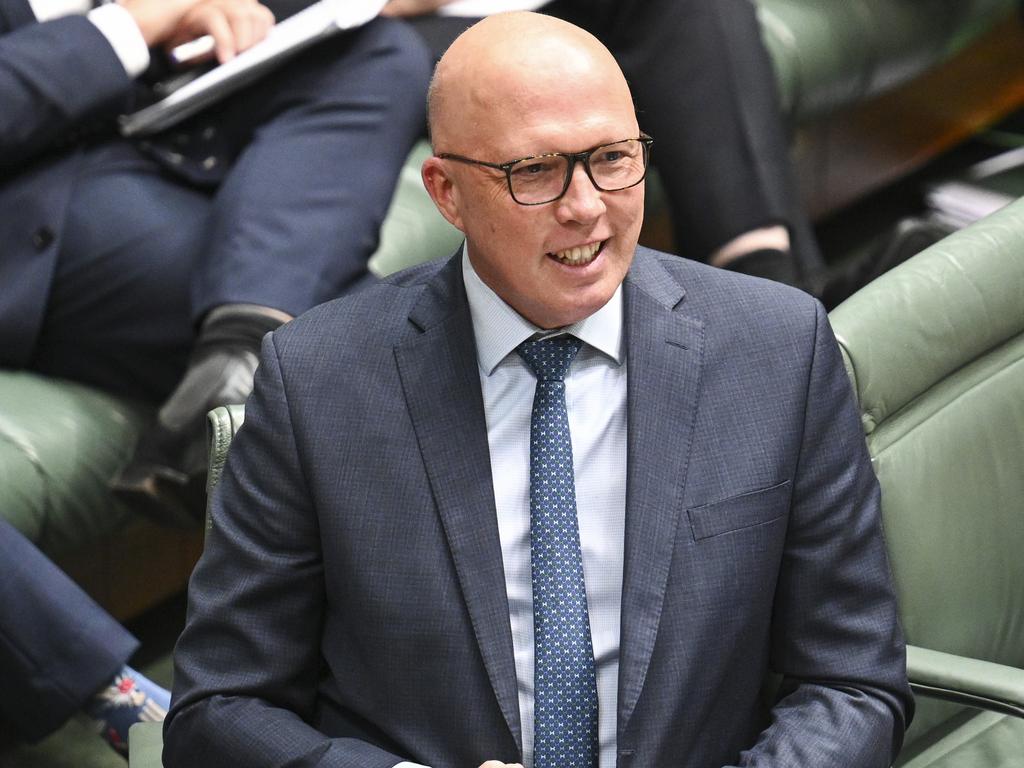
Before historians and political scientists get at him, we have writers like Lech Blaine. His first, rough draft of the Dutton legacy is the 119-page Quarterly Essay: Bad Cop: Peter Dutton’s Strongman Politics.
It is the 93rd edition of a journal launched in 2001.

While he initially tries hard to be neutral, Blaine’s thesis is that Dutton is a thin-skinned tough guy. The closing lines give the game away: “Tall and strong at first glance. But when you watch him for a long time, you can see that the man is small and scared.” Blaine forces us into a lengthy, often revealing, consistently readable, but clearly not balanced, assessment of the Opposition Leader.
He is tempted to always find the worst in his subject. I ran a light touch content analysis. The debits easily outweigh the credits. “Dutton is a punisher. His desire to discipline the vulnerable comes from a visceral place … [P]ower is a means to punishment.”
Blaine calls Dutton “a right-wing headkicker” and “redneck”, “great at punishing asylum seekers”, “the most power-hungry person in the Australian parliament”, and a “spectre haunting” his colleagues. He implies he is a race baiter, a Pauline Hanson sympathiser, a tax dodger, a misogynist, a climate denier, and a strategic homophobe.

Dutton’s lived experience as a Brisbane cop, in some brutal child murder cases, never quite offsets Blaine’s distaste for him. There is empathy for his subject – Blaine was the only survivor of a car crash that killed three of his friends in 2009 – but not sympathy. For Blaine, a student of Queensland politics, Dutton is what the Sunshine State produces.
Dutton’s office did not respond to his interview requests. Some of Blaine’s sources are “on background or off the record”. He interviewed George Brandis and quotes him more than any other Liberal source. Malcolm Turnbull is a distant second.
I rewatched Dutton’s sometimes awkward ABC Kitchen Cabinet encounter with Annabel Crabb and realised I could have skipped 10 per cent of the essay. But the other 90 held me.
I did enjoy the author getting down and dirty in the politics of Dutton’s home state. Blaine offers a reminder that politics exists in Queensland. I live in the one-party state of Victoria. The Opposition is increasingly inept, Labor-lite. But, up there, politicians like Dutton were forged in ideological combat. His career is one of conflict, trauma, and tragedy. Real life and death (of children most tragically) has shaped Dutton’s version of social justice.
The Liberal leader did not work out his ideology, like so many Young Liberals, on a laptop in a library carrel. “The son of a Brisbane bricklayer, he bombed out of university to become a copper.” His “pitilessness”, Blaine’s summary adjective for the Liberal leader, was not socialised out of him on a university campus.

We learn much about Dutton from Blaine – and even more about how and why the Australian progressive elite reviles him.
The author is writing for that market. And herein lies part of the problem.
Quarterly Essay is now well into its third decade. It bills itself as “Australia’s leading journal of politics, culture and debate.” Is it? What has been its contribution to our intellectual and cultural life? Does the Dutton essay advance a long-curated diversity of viewpoints? Hardly. Blaine tries, early on, to give Dutton his due. By the close, he has reinforced the caricature I imagine most QE subscribers already held.
Why not commission a conservative to write about Australian conservatism? Even more radical: have someone from the right dissect a left-wing cause or celebrity. Conservative authors are as rare as hen’s teeth. The left on the left? Oh yes. No problem. See The High Road: What Australia can Learn from New Zealand, by Laura Tingle, written during Covid lockdown. Mask or no mask, you might die of enervation – if the dripping condensation didn’t drown you first.
Or consider Tim Flannery. His three essays read as if he told ChatGPT to “Sound like me on the self-evident moral superiority and universality of environmentalism. Across 100 (recycled) pages.” These and other climate change essays extend a plodding orthodoxy on the subject. Up next (issue 94): a “searing” (read boringly predictable) disquisition on “climate peril and paralysis”. Essays by dissenters are absent.
Ditto, the Voice. QE commissioned a legal scholar, Megan Davis, to make the apparently unimpeachable case for Yes. Her Voice of Reason: On Recognition and Renewal was not seen to warrant a counter response. The editors found no equivalent space for an essay even mildly sympathetic to No. Was Davis and the Yes campaign well served thereby? The referendum result suggests not.
When the focus is somewhere else, notably China, the essays are more compelling. Peter Hartcher’s (2019) Red Flag: Waking Up to China’s Challenge is strong. Not at all dull. James Brown (a rare, possibly solitary, Liberal) on the legacy of the Iraq war is excellent. But progressive Australians on Australian progressivism? The essays are so-so.
Quarterly Essay began in a left-wing bubble and has mostly stayed there. Robert Manne’s denunciation of the “right-wing campaign” against Indigenous justice claims (In Denial: The stolen generations and the Right) inaugurated the journal in 2001. Lech Blaine’s scorn of Dutton’s tin ear on Indigenous issues brings this authorial bias full circle.
The opening few years offered Guardian-style editorials (only much longer) attacking predictable targets of progressive ire: right-wing ignorance of Indigenous people, John Howard’s appeasement of Jakarta (on East Timor), Howard’s electoral success, his devotion to George W. Bush, and the “politics of fear” (on refugees). By the end of year two, the focus shifted from anti-right to more mainstream pro-left. Essays talked up the Greens (when they seemed young and vital), the prospects for Labor, and the virtues of population control.
By 2010, Waleed Aly was the QE oracle on Australian conservatism. In 2011, the journal lambasted the Murdoch empire. By 2022, Anthony Albanese’s treatment at the hands of the Guardian’s Katharine Murphy was deemed so scathing, the PM had to hire her. Is this evidence of Quarterly Essay doing its job? A journal by the progressive media elite, for the progressive political elite?
Is it brave enough? It claims to “set the agenda”. I asked some of my academic colleagues, left and (secret) right what the words Quarterly Essay meant to them: “a brand of middle brow Australian left of centre-ism that could not be more beige, mediocre, conformist. I think of David Marr and most ABC journalists. The Quarterly Essay is their in-house journal.” Another admitted to a “diffuse, unattributed positive feeling, so guessing left-wing?”
Blaine wants us to consider Dutton as a kind of Australian Trump. Instead, by making the Queenslander deplorable, he obscures for his comfortable and complacent readers the appeal of leaders like them. Given the luxury of length afforded their authors, far more of these essays should sing. There is plenty of preaching to the choir. But is there enough singing?
Timothy Lynch is a professor of political science at the University of Melbourne.





The fate of all conservative leaders is to have their legacy determined by progressive academics. In a recent polling of (overwhelmingly left leaning) scholars of the US presidency, Donald Trump was ranked 45th (out of 45). It is not hard to imagine how Peter Dutton, the leader of the Liberal Party, will fair with Australia’s professoriate.